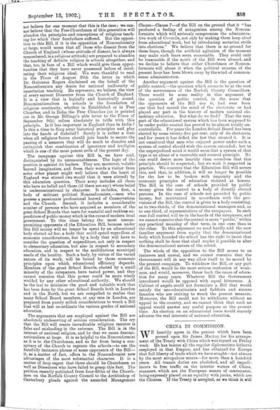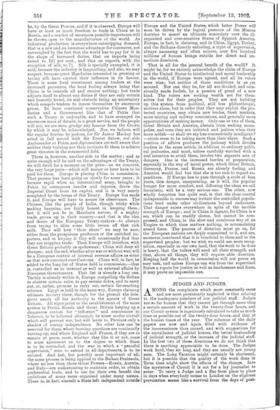CHINA IN COMMISSION.
WE heartily agree in the praises which have been poured upon Sir James Mackay for his arrange- ment of the Treaty with China which was signed on Friday week. He has beaten all the regular diplomatists hitherto employed in that Empire, and has obtained for Europe that full liberty of trade which we have sought—not always by the most scrupulous means—for more than a hundred years. All transit duties are abolished, and all impedi- ments to free traffic on the interior waters of China, steamers, which are the European means of conveyance, being expressly placed on an equality with junks, which are the Chinese. If the Treaty is accepted, as we think it will be, by the Great Powers, and if it is observed, Europe will have at least as much freedom to trade in China as in Russia, and a market of enormous possible importance will be thrown open to the manufacturers of the world. As industrial production is everywhere outstripping demand, that is a new and an immense advantage for commerce, not outweighed by the fact that the world has to pay for it in the shape of increased duties, that on imports being raised to 121 per cent., and that on exports, with the exception of silk, to 71. Silk is specially exempted, it is said, because the industry is languishing, and also, we may suspect, because great Mandarins interested in growing or taxing silk have exerted their influence in its favour.
There is some local resentment among traders at the increased payments, the local feeling always being that China is to concede all and receive nothing; but trade adjusts itself to almost any duties if they are only certain and honestly levied, its real obstacle being an uncertainty which compels traders to insure themselves by enormous prices. To have convinced conservative Chinese Man- darins and a Government like that of Pekin that such a Treaty is endurable, and to have arranged its enormous mass of details, is a great service, and the people will not, we are sure, grudge any honour from the Crown by which it may be acknowledged. Nor, we believe, will the regular Service be jealous, for Sir James Mackay has acted in full accord with Sir Ernest Satow, our able Ambassador at Pekin, and diplomatists are well aware that neither their training nor their instincts fit them to achieve great victories in the commercial field.
There is, however, another side to the matter; and as quite enough will be said on the advantages of the Treaty, we will dwell for a moment on the price—as we conceive, the very large price—which will sooner or later have to be paid for them. Europe is placing China in commission. That process has been going on slowly for some years ; it became rapid when an international army, brought to Pekin by outrageous insults and injuries, drove the Imperial Court from its capital, and it is very nearly completed by the terms of this Treaty. Europe has made it, and Europe will have to secure its observance. The Chinese, like the people of India, though tricky while making bargains, are fairly honest in keeping them ; but it will not be in Mandarin nature, if a mighty trade grows up in their country—and that is the idea and desire of the European Treaty-makers—to abstain from trying to skim some little cream off that rich milk. They will levy "their share" we may be sure, either from the prosperous producers or the enriched im- porters, and in levying it they will occasionally find that they are stopping trade. Then Europe will interfere, with Great Britain probably as spokesman ; China will deny all charges ; and the end, whether after war or without war, will be a European control of internal revenue affairs as strict as that now exercised over Customs. China will, in fact, be added to the long list of States held in commission,—that is, controlled as to internal as well as external affairs by European Governments. That list is already a long one. Turkey is already within it, Europe compelling the Sultan to observe certain rules, to pay certain debts, and to carry out, or, rather, promise to carry out, certain far-reaching reforms. Egypt is held in the same way, Europe claiming ultimate mastery there, though for the present she dele- gates nearly all her authority to the agents of Great Britain. All signs point to the establishment of the same system in Persia, Russia and Great Britain keeping up a dangerous contest for " influence " and concessions in Teheran, to be followed ultimately by some modus vivendi which will prevent war, but will leave to Persians only a shadow of uneasy independence. No other fate can be reserved for Siam, where burning questions are continually turning up, and where England and France, if they are to remain at peace, must, whether they like it or not, come to some agreement as to the degree to which Siam is to be controlled, and the way in which a "peaceful supervision," sure to extend to all departments, is to be secured. And last, but possibly most important of all, the same process is being applied to the Balkan Peninsula, where no less than three Great Powers—Russia, Austria, and Italy—are endeavouring to maintain order, to obtain preferential trade, and to use for their own benefit the ambitions of many races organised under many names. There is, in fact, scarcely a State left independent outside Europe and the -United States, which latter Power will soon be driven by the logical pressure of the Monroe doctrine to assert an ultimate suzerainty over the ill. organised and over-sensitive States of Spanish America. Europe, in fact, is claiming, and in China, Egypt, Turkey, and the Balkans directly enforcing, a right of supervision, always unceasing and often minute, over five hundred millions of human beings outside her direct and im- mediate dominion.
That is all for the general benefit of the world ? It might be, for we entirely acknowledge the claim of Europe' and the United States to intellectual and moral leadership in the world, if Europe were agreed, and all its rulers were wise ; but neither of those conditions is as yet secured. Nor can they be, for all are divided, and occa- sionally made foolish, by a passion of greed of a new kind. The rulers are seeking wealth not for them- selves but for their peoples. They are not building up this system from political, still less philanthropic, motives alone, but in order that they may exploit the pro- tected countries, may obtain new trades, fresh markets, more mining and railway concessions, and generally more opportunities of making money. Only one or two of them, Great Britain and America, abstain from seeking mono- polies, and even they are irritated and jealous when their more selfish—or shall We say less commercially intelligent ? —rivals seem to be taking more than their share. Such a position of affairs produces the jealousy which divides traders in the same article, in addition to ordinary politi- cal jealousies, and must, unless carefully watched with a real intention to avoid them, involve two separate sets of dangers. One is the increased burden of preparation, especially in the way of naval power, which Great Britain, Germany, France, and Russia are already feeling, and America would feel but that she is too rich to regard ex- penditure. If Europe has to pass through a cycle of lean years, this danger, exasperating, as it will, the popular hunger for more comfort, and diffusing the ideas we call Socialistic, will be a very serious one. The other, now wholly forgotten but quite real, is that the close control indispensable to success may irritate the controlled popula- tions bred under other civilisations beyond endurance. That danger exists everywhere in spite of the terrible strength of Europe ; and in China it isgrave, for China is a sea which can be readily cloven, but cannot be com- pressed, and China, in the slow and cumbrous way of an Empire to which time matters nothing, is accumulating armed force. The process of dictation must go on, for the European nations are deeply committed to it, and are, moreover, convinced that it is beneficial to them and to the supervised peoples ; but we wish we could see more recog- nition, especially in our own land, that the work to be done is heavy, that the toilers will need all their strength, and that, above all things, they will require able direction. Keeping half the world in commission will not prove an easy task, and unless Europe can win from the supervised States a repute for justice as well as fearlessness and force, it may prove an impossible one.







































 Previous page
Previous page